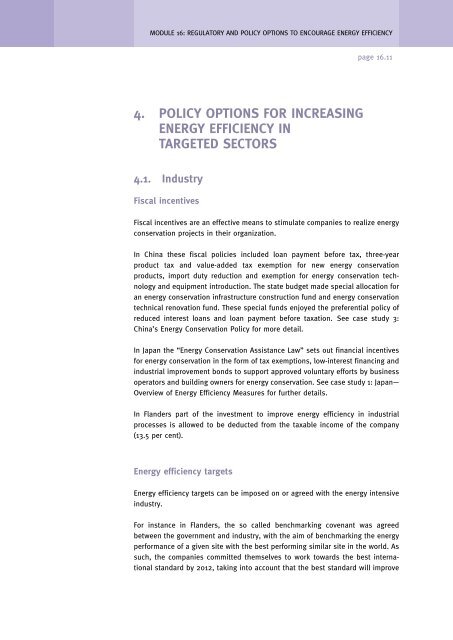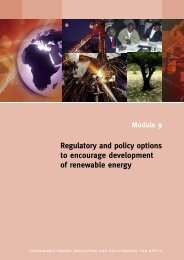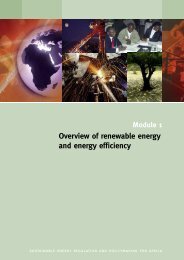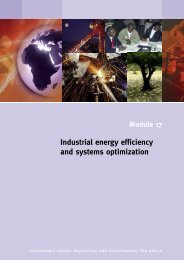Regulatory and policy options to encourage energy efficiency - unido
Regulatory and policy options to encourage energy efficiency - unido
Regulatory and policy options to encourage energy efficiency - unido
Create successful ePaper yourself
Turn your PDF publications into a flip-book with our unique Google optimized e-Paper software.
MODULE 16: REGULATORY AND POLICY OPTIONS TO ENCOURAGE ENERGY EFFICIENCYpage 16.114. POLICY OPTIONS FOR INCREASINGENERGY EFFICIENCY INTARGETED SECTORS4.1. IndustryFiscal incentivesFiscal incentives are an effective means <strong>to</strong> stimulate companies <strong>to</strong> realize <strong>energy</strong>conservation projects in their organization.In China these fiscal policies included loan payment before tax, three-yearproduct tax <strong>and</strong> value-added tax exemption for new <strong>energy</strong> conservationproducts, import duty reduction <strong>and</strong> exemption for <strong>energy</strong> conservation technology<strong>and</strong> equipment introduction. The state budget made special allocation foran <strong>energy</strong> conservation infrastructure construction fund <strong>and</strong> <strong>energy</strong> conservationtechnical renovation fund. These special funds enjoyed the preferential <strong>policy</strong> ofreduced interest loans <strong>and</strong> loan payment before taxation. See case study 3:China’s Energy Conservation Policy for more detail.In Japan the “Energy Conservation Assistance Law” sets out financial incentivesfor <strong>energy</strong> conservation in the form of tax exemptions, low-interest financing <strong>and</strong>industrial improvement bonds <strong>to</strong> support approved voluntary efforts by businessopera<strong>to</strong>rs <strong>and</strong> building owners for <strong>energy</strong> conservation. See case study 1: Japan—Overview of Energy Efficiency Measures for further details.In Fl<strong>and</strong>ers part of the investment <strong>to</strong> improve <strong>energy</strong> <strong>efficiency</strong> in industrialprocesses is allowed <strong>to</strong> be deducted from the taxable income of the company(13.5 per cent).Energy <strong>efficiency</strong> targetsEnergy <strong>efficiency</strong> targets can be imposed on or agreed with the <strong>energy</strong> intensiveindustry.For instance in Fl<strong>and</strong>ers, the so called benchmarking covenant was agreedbetween the government <strong>and</strong> industry, with the aim of benchmarking the <strong>energy</strong>performance of a given site with the best performing similar site in the world. Assuch, the companies committed themselves <strong>to</strong> work <strong>to</strong>wards the best internationalst<strong>and</strong>ard by 2012, taking in<strong>to</strong> account that the best st<strong>and</strong>ard will improve










